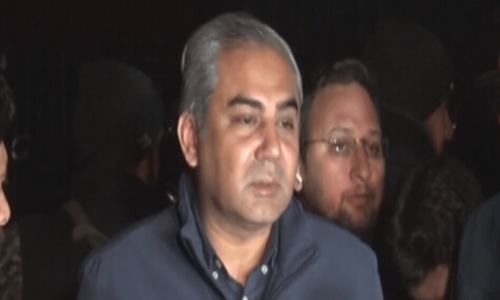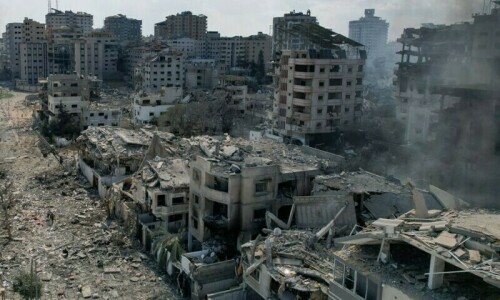
Only the newly-appointed guard was still present as he sat with his eyes wide open like a deer in the dark. Actually, there are several guards who work on weekly rotations but I only become aware of their appointments when they respectfully stand up to greet me, assuming I am among the more important personnel working at the channel.
Within a day or two, they cease to do that once they realise I am not as big a fish as they had presumed.
A few days ago, one of the guards stopped me to ask how he could make his son study at a modern (private) school.
“You can’t afford the fee of the modern school,” I told him, a little anxiously.
“I’ll sell the small piece of land that I have back in my village,” he replied with a self assertion.
“How many children do you have?” I inquired.
“Seven,” he replied, with an ambivalent feeling of pride and petulance.
“What would rest of the children do if you put all you have on your son’s education?” I responded, curtly.
“I will be able to save all of them from joining the Taliban if I succeed in giving the eldest modern education. I want my children to be engrossed in thoughts and work smartly like you people do.”
I then asked him where he hailed from.
“Bajaur,” he replied sternly.
I went downstairs, trying to convince myself that it was merely the guard’s outrageous imagination that led him to consider this option.
As I got out of the office, I hailed a rickshaw. Its screech could be heard everywhere on the Davis Road (which is now called Sir Agha Khan Road after it has been Islamised like several other thoroughfares and roads).
He was hesitant to drive 25 kilometres to Valencia to drop me for the fare I offered.
“Sir! I will not even get a slap on my face for such a meagre amount,” he murmured apologetically.
“Do you want me to take off my coat and offer it along with the fare,” I retorted.
After a little haggling, a deal was reached and we set off.
The rickshaw was meticulously decorated from the inside. The side doors were embellished with artificial flowers, garlands and tiny mirrors. A blue light and the fragrance of jasmine created a spell of forgetfulness. A little box was staked with some pieces of newspapers.
“Is this a rickshaw or a cabin of a prostitute?” I wondered aloud.
“Sir! You may not have offered me a decent fare but the passengers with pretty companions give us opportunities to earn handsomely.”
He then went into the details about how rickshaw drivers extorted money from the dating couples.
Already annoyed with the Ishq-i-Mamnoon generation, I tried to change the topic and asked him which political party he would vote for in the upcoming elections.
“I’ll vote for the one that promises to cut down the prices for three things: Lattha (a type of cloth used for making coffins), roses and two yards of land in any graveyard. Not a bad deal if the winning party makes it easier for the poor to die, eh?”
I asked him if he thought Imran Khan could redeem us from the quagmire.
“He talks about everything except checking the price hike. Never does he speak against the issues of working class in his rallies. These guys think big but not for the working class.”
I resumed my questioning. “How much do you earn in a day?”
“My average income is between three to five hundred rupees. I have to feed seven children, three sisters and my parents”.
I asked how he managed and he said that he had reached the brink of starvation and finding no way out. Someone advised him to send his four sons to a madressah, where they would get free food and education.
“I sent my three younger sons to a madressah in my native village, Shuja Abad, but put the eldest son in a workshop.”
He said all his sons were likely to plunge into the realm of vulgar activities like performing arts but his spiritual mentor bestowed upon him “the directions of God and he sent all three of them to madressah.”
“Actually movies and modern-day activities have corrupted the morals of the children. The couples stealthily on date are my bigger source of income, believe me!”
“Do you know the children equipped with one sided education are likely to fall into the sphere of religious sentimentalism which eventually leads to terrorism and fundamentalism?” I said to him.
“Okay! What then?”
“You don’t even care for the lives of your children for small benefits?”
“What is the worst that could happen, sir? They would be picked by extremist groups, would fight against the non believers; would die of bullets. They would be well fed until the death. If they lived with me, they would face hunger, deprivation and humiliation” he said, a bit frantically.
I was speechless. I can deliver a lecture against the extremism but I had nothing to say against unequal sharing of blessings under this democracy and capitalism, although I know under any other system there would be unequal sharing of miseries.
Four years have elapsed since I met him.
At the moment I am sitting in the rickshaw. Musaddaq, the guard from Bajaur, is driving it. He has sold his land and his children are settled in Lahore. They are studying here. Mussadaq has been into the business of transportation for two years.
Mussadaq told me about Ishtiaq, the rickshaw driver I met two years back, that he was incarcerated by agencies. He was accused of supporting some young men in a terrorist activity, which was checked in time...

The views expressed by this blogger and in the following reader comments do not necessarily reflect the views and policies of the Dawn Media Group.












































